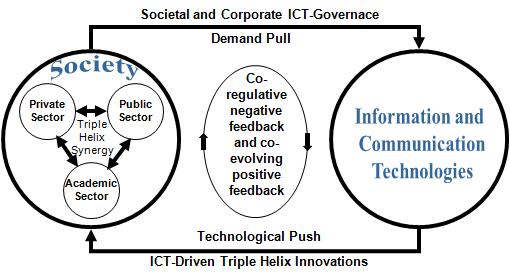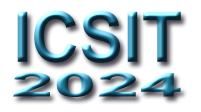Purpose
The comprehensive and profound impact of Information and Communication Technologies (ICT) on Society is a very known fact. In turn, private, public and academic organizations are generating new requirements and demands that must be addressed by ICT. Demand-Pull and Technological-Push are interacting with each other through cybernetic loops. Society and ICT are co-regulating each other via negative Feedback Loops and synergistically co-evolving via positive feedback loops. On the other hands, ICT is increasingly supporting synergistic relationships among three important societal domain: the private, the public and the academic sector. The known universities-industries-governments Triple Helix Model support the conception, design and implementation of ICT-Driven Triple Helix Innovations.

The purpose of the Organizing Committee of the International Conference on Society and Information Technologies (ICSIT 2024) is to support and accelerate the cybernetic loops between Society and ICT and to help in the creation of relationships among different societal sectors, by means of bringing together researchers, professionals, practitioners and decision-makers from the Academic, Private and Public Sectors to share their findings, experience and knowledge with regards to the applications and impact of ICT.
ICT Applications originally created and implemented in a societal sector showed to be also useful and effective in another sectors. Analogical thinking and interdisciplinary approaches have supported the re-conception and re-design of an ICT application that showed to be effective and useful in one domain to another societal domain. The conception of Science 2.0 for example has been done by means of analogical thinking applied to the concept of Web 2.0, and the spread socio-technical systems, as it is the case of MySpace, Facebook, Wikipedia, flickr, YouTube, etc.
“MySpace and Facebook [for example] encourage casual social networks, but they may soon play more serious roles in facilitating emergency/disaster response.” (Sheiderman, Science 2.0, in Science Vol. 319 7 March 2008). “Science 2.0 – affirm Shneiderman - will be especially important to meet the design challenges in secure voting, global environmental protection, energy sustainability, and international development among many others. Conceiving Science 2:0 is an example of the ways how ICT-Driven Triple-Helix innovations can be used to generate Triple-Helix Synergy and Society-ICT cybernetic loops.
ICSIT 2024 Organizing Committee hopes to contribute to the catalytic process required for the generation of ICT-Driven Triple Helix Innovations, the generation of Triple Helix Synergy and the formation of co-regulative and co-evolutionary cybernetic loops between Society and the ICT.
Submissions
Articles might be submitted for face-to-face or virtual participation in the conference. For details regarding the types of submission, please click here.
Submitted papers will have double-blind and non-blind review. They may also have peer-to-peer participative review. More details regarding the Reviewing Policy can be found by clicking on the link "Multi-Methodological Reviewing Process for Multi-Disciplinary Conferences" under the "Reviewers" tab.
The acceptance policy to be applied to the reviewed submissions made to ICSIT 2024 is based on the Majority Rule, applied to the reviews received for each submitted article. Details on this issue can be found by clicking on the link "Acceptance Policy" under the "General Info" tab.
Invited Sessions
Invited Sessions can be organized in a specific or a general theme. These Invited Sessions may grow to Focus Symposia, workshops, satellite events, micro-conferences or even conferences by their own in the context of ICSIT or as independent or associated spin offs from ICSIT.
Invited Sessions with high quality papers might be selected for multiple-authors book publications.
Best papers
The best paper of each section will be selected and their author (s) will receive a corresponding Award Certificate.
Authors of the Best 25%-30% papers presented at the conference will be invited to adapt their papers for their publication in the Journal of Systemics, Cybernetics and Informatics (JSCI).

